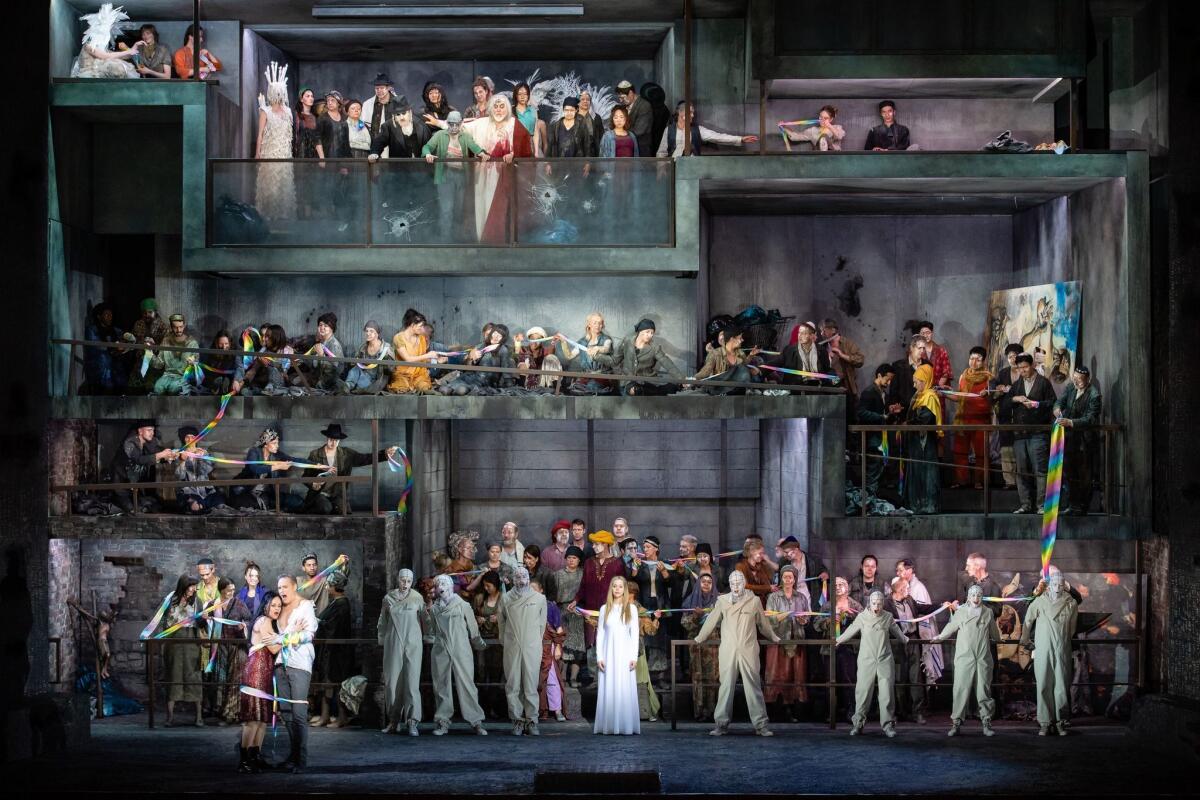Critic’s Notebook: Operas in Berlin and Hamburg go Babylonian, with Trump and an immigration crisis
- Share via
Reporting from Hamburg, Germany — For whatever reason — a worry about looming dystopia, perhaps — Germany is having its Babylonian moment. Major new opera productions here in Hamburg and in Berlin last weekend proved media sensations that put Babylon not only in the operatic spotlight but also on the evening news.
In Verdi’s “Nabucco” at Hamburg State Opera on Sunday night, the biblical account of the Jews’ expulsion from Babylon was updated to the present-day Syrian immigrant crisis and filled with such Trumpian rhetoric as “The people of Baal will be great again.” The prominent Russian film, theater, dance and opera director Kirill Serebrennikov, who is under house arrest in Moscow, provided the staging, sets and costumes. Syrian immigrants recently arrived in Hamburg portrayed the exiled Jews.
Meanwhile, Babylon took on the most immoderate overtones imaginable the night before in an extraordinary new Staatsoper Unter der Linden in Berlin production of Jörg Widmann’s “Babylon.” The 2012 epic opera is of such wondrous aspiration that it makes room for dealing with issues of immigration, anti-Semitism, mysticism, ritual sacrifice, orgies, scorpion bestiality, the underworld and unspeakable more. It is, furthermore, the only opera I know of that contains “genitalia septets.”
But it was “Nabucco” that was in the news. The German press has dubbed Serebrennikov a rock star of Russian dissident artists. He has been charged with embezzling $2 million in state funds, an accusation he calls a farce. As he awaits trial, Serebrennikov has been allowed neither telephone nor internet. He may communicate only with his father, lawyer and investigators. But he was not prevented from a daily exchange by mail of USB data sticks of the “Nabucco” rehearsals, to which he returned his instructions to his Russian colleague and co-director in Hamburg, Evgeny Kulagin.
In his production, Serebrennikov makes no allusions (other than a photo) to Russian President Vladimir Putin, of whom he appears to have run afoul. U.S. President Trump will do as a fill-in for Putin.
The setting for the production is the United Nations, where the desks for the Security Council are being set during the overture. A monitor in the background shows news clips, and over the stage is a scroll of headlines, such as “The wall will work, I will get it built.”
The high priest, Zaccaria, who warns Jews of the advancing Babylonian army, looks like any nondescript diplomat. Most of the opera plays out in U.N. offices where the once-populist Nabucco Donoso, who campaigned with the motto “Assyria First,” is felled by a stroke after declaring himself God. He is deposed by the vehemently anti-immigrant Abigaille, who claims to be his daughter.
During scene changes, Syrian musicians sing in front of a large video screen showing graphic clips of exiles on their flimsy boats, bedraggled and hungry at the border or killed in Aleppo. The great patriotic hymn “Va Pensiero” is sung once by the opera chorus facing the audience accusingly. It is then sung again by a chorus of Syrians. The first is shocking; the second, heart-wrenching. Only the second was needed.
Serebrennikov has an excellent sense of theater that gets him around making historical or contemporary political sense. He also inspires a thrilling cast that includes Oksana Dyka as the ferociously believable Abigaille and Dimitri Platanias as a stout, formidable Nabucco. Paolo Carignani’s vibrant conducting supplies the needed Italianate touch.
But at times Serebrennikov’s understandable bitterness weighs him down. He overdoes the political wisecracks, and his agitprop can be in danger of using Syrians as props. At least he has a sense of humor, and many little comic touches help. His Hamburg staging team members received a standing ovation for their curtain when they walked onstage holding a “Free Kirill” banner.
Although not as sensationalist politically, the Berlin “Babylon” proved a much greater sensation theatrically, thanks in great part to Andreas Kriegenburg’s fabulous production, which provides a weirdness worthy of a latter-day Bruegel. But this is also an opera that includes every trick in the book.
In a libretto by the fashionable Dutch philosopher Peter Sloterdijk, an exiled Jew and Babylonian have, as in “Nabucco,” an illicit romance. This time Tammu and the priestess Inanna are the central story and are patterned after Tamino and Pamina in Mozart’s “The Magic Flute.” But what a world they behold!
There is the Great Flood, in which a dramatic soprano provokes the raging seas. A New Year festival is like Mardi Gras on a massive dose of steroids. Although he’s had plenty of competition over the years, Kriegenburg offers one an orgy for the ages.

To the horror and shame of Inanna, Tammu is sacrificed. She then goes to hell to retrieve him, where she endures gang rape, becomes a kind of Whore of Babylon and is enjoined by a double when three-way sex is required. In a twist from the Orpheus and Eurydice myth, the devil frees Tammu from death and love triumphs.
Widmann — the most performed living composer in Germany and, though still little known in the U.S., the composer-in-residence next season at Carnegie Hall — is made delirious by the whole history of opera. His score is a distorted mix of Strauss, Monteverdi, Stockhausen, Mozart and much else, all made to sound dazzlingly new and original. Don’t ask me why, but a beautiful transformation of “We Three Kings” in the style of Berio from the beyond works ecstatically.
If this sounds over the top, forget about the top. You can’t even find it, it’s so far down below this opera. Yet the most brilliant touch is the way everything is grounded by the chorus of Jewish exiles, which Kriegenburg has hover over a multilevel stage. They look like exiles from all over, sharing the same suffering.
In his massive three-volume philosophical study, “Spheres,” Sloterdijk’s concern is with what he calls the “spaces of coexistence,” and the unforgettable production makes harrowing the sense of the extremes of apartness we are now enduring in modern society. An inspired cast — highlighted by Susanne Elmark (Inanna), Charles Workman (Tammu), John Tomlinson (the Babylonian priest) and Marina Prudenskaya (electrifying the waters of the flood) — does the rest.

Daniel Barenboim, who is the music director of the Staatsoper and the vision behind this production, had to drop out during the final rehearsals for eye surgery. Christopher Ward, who had been the assistant to Kent Nagano at the “Babylon” premiere in Munich, triumphantly took over.
In fact, Nagano strangely hovers over the background of both “Babylon” and “Nabucco.” He commissioned and premiered Widmann’s opera when he was music director at Bavarian State Opera (where he also first enticed Kriegenburg, a noted theater director, to try his hand at opera). Now Nagano serves as the general music director of the Hamburg State Opera. You might also recall Nagano as the former music director of Los Angeles Opera. But thanks to him, even Hollywood Babylon can no longer hold a candle to Berlin.

More to Read
The biggest entertainment stories
Get our big stories about Hollywood, film, television, music, arts, culture and more right in your inbox as soon as they publish.
You may occasionally receive promotional content from the Los Angeles Times.











